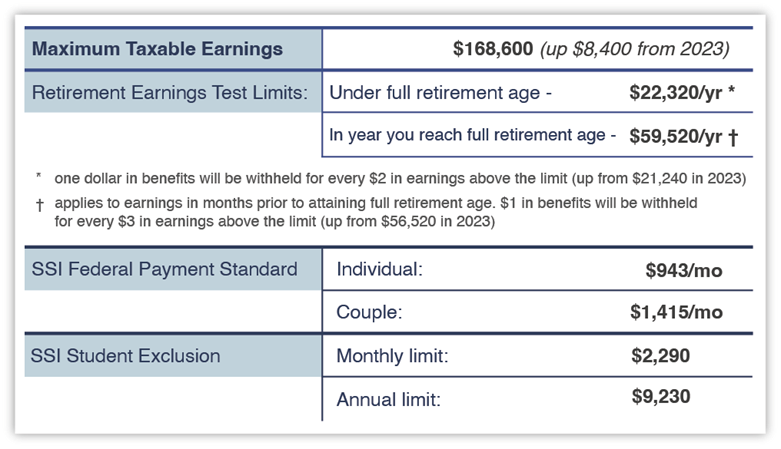Hike in Social Security Benefits Announced for 2024 How much you pay and checks received are all going up!

Tip Category: Retirement

2024 Social Security Benefits - Key Information
What it means for you
- Up to $168,600 in wages will be subject to Social Security taxes, an increase of $8,400 from 2023. This amounts to $10,453.20 in maximum annual employee Social Security payments (an increase of $520!), so plan accordingly. Any excess Social Security taxes paid because of having multiple employers can be returned to you as a credit on your tax return.
- For all retired workers receiving Social Security retirement benefits, the estimated average monthly benefit will be $1,907 per month in 2024, an average increase of $80 per month.
- SSI is the standard payment for people in need. To qualify for this payment, you must have little income and few resources ($2,000 if single, $3,000 if married).
- A full-time student who is blind or disabled can still receive SSI benefits as long as earned income does not exceed the monthly and annual student exclusion amounts listed above.
Social Security & Medicare Rates
The Social Security and Medicare tax rates do not change from 2023 to 2024. The rates are 6.20 percent for Social Security and 1.45 percent for Medicare. There is also a 0.9 percent Medicare wages surtax for single taxpayers with wages above $200,000 ($250,000 for joint filers) that is not reflected in these figures. Please note that your employer also pays a 6.2 percent Social Security tax and a 1.45 percent Medicare tax on your behalf. These amounts are reflected in the self-employment tax rate of 15.3%, as self-employed individuals pay both halves of the tax rate.
CONTACT INFORMATION
Phone: (360) 423-4520
Fax: (360) 425-9540
Address: 1424 14th Ave Longview, WA 98632
Business Hours
- Mon - Thu
- -
- Friday
- -
- Sat - Sun
- Closed






LOCATION

